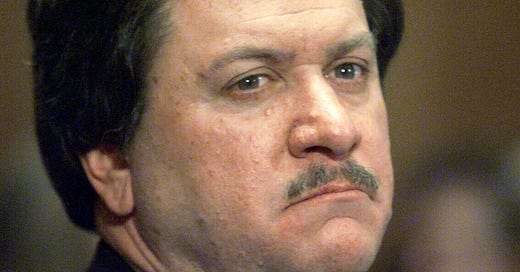MAJOR BREAKING NEWS: The Secret Behind Trump’s January 2 Phone Call Revealed
Congress must subpoena Joe diGenova and the Stop the Steal leaders who were on Trump's January 2 pre-insurrection strategy call. If it does, it will discover in full what Trump planned for January 6.
Introduction
Late last night, CNN reported that the House January 6 Committee will subpoena testimony from Donald Trump lawyer John Eastman, author of a now-infamous pre-January 6 memo that may well run afoul of federal criminal statutes and has been the subject of significant reporting from Proof over the last two weeks.
The problem with this prospective subpoena is that Eastman has a host of arguments available to him to resist calls for him to testify to the House January 6 Committee.
First, allegations that Eastman’s attempts to thwart the 2020 presidential election—codified in the above-linked Eastman Memo—could amount to participation in a criminal conspiracy to commit election fraud or even sedition gives Eastman the possibility of asserting his Fifth Amendment right against self-incrimination.
Second, as Proof has reported, even at the beginning of 2021 Eastman was identifying himself as a “lawyer for the president”, a claim Trump himself has spoken little on but could now—if only to ensure Eastman’s silence before Congress—publicly echo.
Third, as Eastman was also one of the two primary mainstays in Trump’s Insurrection Week Willard Hotel “war room”/ “command center”—the other being fellow Trump lawyer Rudy Giuliani—he may, despite not being a member of the executive branch, be able to make the claim that, whether formally retained by Trump as his lawyer or not, in December 2020 and January 2021 he was acting a presidential adviser of the sort whose confidential communications with a president the federal courts would naturally want to protect. After all, as Proof has reported, it was Eastman who briefed both the President of the United States and Vice President Mike Pence in the Oval Office on Monday, January 4, just 48 hours before the insurrection. He might not have been drawing a federal paycheck at the time, and may or may not have been formally retained as Trump’s legal counsel—indeed it’s unlikely that he was, given that Trump historically avoids making promises of any kind to lawyers until he’s decided to pay them, which rarely happens—but there can be little doubt that Eastman was a leading Trump adviser in the run-up to January 6.
Some may wonder whether Eastman waived attorney-client privilege by spreading his legal advice to Trump—in the form of the aforementioned memo—to various men in Trump’s inner circle who weren’t also on Trump’s legal team at the time, for instance Vice President Pence. The problem with this end-around is that it is always the client, not the attorney, who controls attorney-client privilege. So an attorney violating that privilege and disclosing confidential communications does not pierce the privilege. A better argument to make on this score would be that Trump himself waived attorney-client privilege by asking Pence to sit in with him and Eastman on January 4, or that Eastman made many of his claims in court filings in December 2020 and in interviews with people like Trump adviser Steve Bannon in January 2021—both before the attack on the Capitol and afterward—meaning that whatever the status of his privilege with the former president, his claims did not constitute confidential legal advice to Trump.
Yet this last point is precisely the point: as we already know much of what Eastman told Trump, and what he told Trump that we don’t already know may well be covered by attorney-client privilege, it remains unclear how much new information Congress will be able to get from him. While a full piercing of the attorney-client privilege would likely produce some new evidence implicating Trump in the events of January 6—and while the privilege’s “crime-fraud” exception could well come into play here—Eastman himself would have a great deal of say on whether that exception would be triggered, and thus far neither the DOJ nor any local prosecutors in Georgia, New York, or D.C. have taken the sort of legal action against Trump that would clearly support such a triggering. In the absence of ex camera review of an Eastman proffer by a federal judge, or a series of ex parte hearings on the matter—either of which would take months or more to play out, time the House January 6 Committee may or may not have given GOP plans to shutter the Committee if it takes Congress in November of 2022—it’s not clear that Eastman will offer much helpful testimony to Congress.
But is there someone else Congress could speak to right now who has both more to offer the Committee and less basis to argue that he can’t be compelled to do so?
The Trump Lawyer to Speak to Isn’t a Trump Lawyer
Newly discovered information about another man very close to Trump suggests that he might be the person Congress needs to speak to—not just because it appears he has a great deal to say, but because he is precluded from claiming that he’s Trump’s lawyer on the grounds that both he and Donald Trump have repeatedly insisted that he is not.





